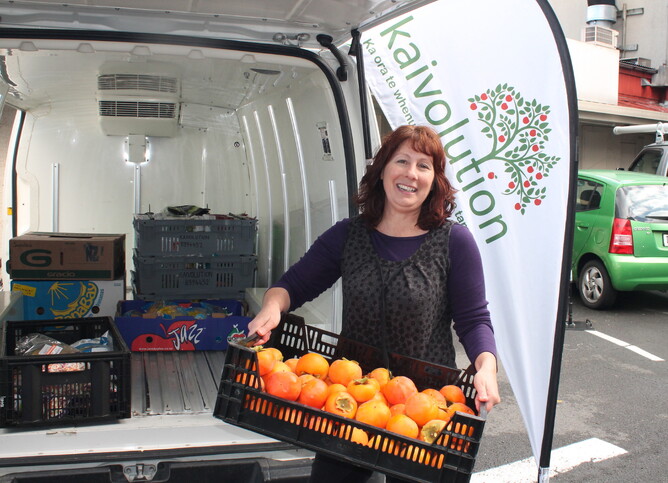Kaivolution hits 100 tonne milestone, but needs help to grow
Hamilton food rescue organisation Kaivolution is celebrating a big milestone with a party – and a call for support.
Since its inception in October 2014 the charitable trust has collected and redistributed 100 tonnes of edible food, approximately the weight of 10 Hamilton City buses.
"That's 100 tonnes of good edible food successfully diverted from landfill," said Waikato Environment Centre general manager Ruth Seabright. "To reach this milestone in just 18 months is humbling and a testiment to the hard work of many in the community, including our volunteers, donor and recipient groups, our staff and our board."
Kaivolution is now regularly rescuing 10 tonnes of food a month, but have reached capacity, and need help from business partners and sponsors to grow.
"Our current space is bursting at the seams, and we have food donors on a waiting list, but we lack the capacity and funding to cope with much more," Seabright said. "We have just scratched the surface in terms of edible waste food and mitigating food poverty. With more resources we could rescue much more and distribute it wider, but we need help from the Hamilton business community."
To celebrate the milestone Kaivolution is hosting a "100 tonne party" on Friday, June 10 between 3pm and 7pm at its Peachgrove Rd headquarters, and the public are invited to attend.
Visitors can tour the site, including the warehouse and chiller where food is stored and packed, and hear the story of Kaivolution from staff and Chairperson Pamela Storey, and learn sustainability strategies from consultant Camilla Carty-Melis. A banquet of gourmet rescued food will be on offer, including quince paste, pumpkin pies, mini quiches, banana and apple cake.
Kaivolution is a six-day-a-week initiative which collects good-quality excess food from Hamilton supermarkets, catering companies, food producers and bakeries, and redistributes that to local charities who feed the city's hungry.Rescued food includes crops that are edible but not commercially viable, fresh produce with some bruising, prepared foods that are unsold that day or excess to requirements (including sandwiches, bread and bakery products), frozen or fresh meat, dairy products, eggs, pre-packaged food or meals in original packaging, non-alcoholic beverages, and food with slightly damaged but uncompromised packaging. Some recipient groups use rescued food for food parcels, while others utilise ingredients to make community meals.
"Before Kaivolution existed vast quantities of perfectly edible food were being thrown away, and people were going hungry," Seabright said. "Now we are rescuing a small proportion of this food, and it is making a difference to the organisations who work with the most vulnerable in our society. It also helps reduce Hamilton's carbon footprint. As a society we really need to be thinking and acting on environmental and social issues in a more holistic way, and Kaivolution is one example of how interdependent these issues are."Kaivolution was set up in October 2014 after a study commissioned by the D V Bryant Trust, Wel Energy Trust, and Trust Waikato found there was an appetite for a "rescue mission" among food suppliers and social service agencies in the city.
Kaivolution is currently funded by local philanthropic trusts and councils, and supported by a roster of around 60 volunteers. Kaivolution has a small 100sqm warehouse space, a tiny 8sqm chiller, and two refrigerated vans.
"It's amazing what we achieve with so little" Seabright said. "Ultimately, initiatives which help resolve environmental and social issues, like Kaivolution, are for the good of us all and we really need businesses – both large and small – to join with the funders to financially support us. Partnering with programmes like Kaivolution will help to create fairer and more healthy environments, now and into the future."
Partnership could take the form of sponsorship, or the donation of large warehouse space or a cool store. For others, it may mean helping Kaivolution with vehicle maintenance and servicing, petrol, or specialist skills such as website or marketing support.
It makes good business sense to protect the environment, and it is fantastic to see more businesses committed to doing their part to minimize waste, Seabright said. "It means a healthier planet, and is something we all need to be contributing too."
Waikato Environment Centre sustainability consultant Carty-Melis runs workshops on sustainable business practices and is available to advise companies on streamlining and managing waste. She also does sustainability and waste audits for businesses.
New Zealanders throw away more than 122,547 tonnes of food a year, according to the 'Love Food Hate Waste NZ' site.To make a dent in Waikato's edible food waste is a real achievement.
"The 100 tonne party is a celebration of our achievement," Seabright said.
"It is also a call out to people to partner with us. This is a service which is good for the planet and good for society so it shouldn't really be down to philanthropic funding to pay for it."
"Kaivolution is a story of community initiative and collaboration and demonstrates what can happen when we all work together for our environment and for our society."
